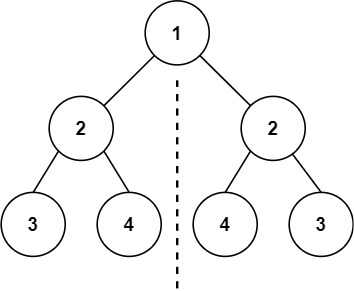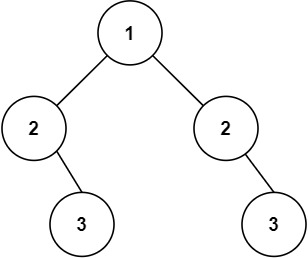LeetCode-in-All
101. Symmetric Tree
Easy
Given the root of a binary tree, check whether it is a mirror of itself (i.e., symmetric around its center).
Example 1:

Input: root = [1,2,2,3,4,4,3]
Output: true
Example 2:

Input: root = [1,2,2,null,3,null,3]
Output: false
Constraints:
- The number of nodes in the tree is in the range
[1, 1000]. -100 <= Node.val <= 100
Follow up: Could you solve it both recursively and iteratively?
To solve the “Symmetric Tree” problem in Java with the Solution class, follow these steps:
- Define a method
isSymmetricin theSolutionclass that takes the root of a binary tree as input and returns true if the tree is symmetric, and false otherwise. - Implement a recursive approach to check if the given binary tree is symmetric:
- Define a helper method
isMirrorthat takes two tree nodes as input parameters. - In the
isMirrormethod, recursively compare the left and right subtrees of the given nodes. - At each step, check if the values of the corresponding nodes are equal and if the left subtree of one node is a mirror image of the right subtree of the other node.
- If both conditions are satisfied for all corresponding nodes, return true; otherwise, return false.
- Define a helper method
- Call the
isMirrormethod with the root’s left and right children to check if the entire tree is symmetric.
Here’s the implementation of the isSymmetric method in Java:
class Solution {
public boolean isSymmetric(TreeNode root) {
if (root == null) {
return true;
}
return isMirror(root.left, root.right);
}
private boolean isMirror(TreeNode left, TreeNode right) {
if (left == null && right == null) {
return true;
}
if (left == null || right == null) {
return false;
}
return (left.val == right.val) && isMirror(left.left, right.right) && isMirror(left.right, right.left);
}
}
This implementation recursively checks whether the given binary tree is symmetric around its center in O(n) time complexity, where n is the number of nodes in the tree.

